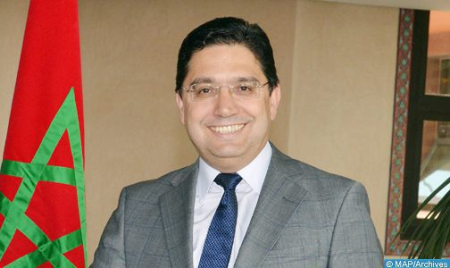Morocco Has Always Endeavored for Promotion of Global Strategy of South-South Cooperation – FM –
Morocco, capitalizing on its historical ties and its deep roots in Africa, has always worked for the promotion of a comprehensive strategy of solidarity-based, multiform and coherent South-South cooperation with African countries in the security, socio-economic, technical, cultural and human aspects, said Minister of Foreign Affairs, African Cooperation and Moroccans Abroad, Nasser Bourita. Bourita stressed, in an address read on his behalf by the acting director of African affairs at the Ministry of Foreign Affairs, African Cooperation and Moroccans Abroad, Lamia Radi, during the national symposium on “Africa in the thought and action of His Majesty King Mohammed VI”, held Monday in Laayoune, that the foreign policy of the Kingdom of Morocco, in the context of South-South cooperation, aims to consolidate and strengthen African unity which is particularly illustrated by the creation of the Organization of African Unity, which Morocco is among the founding members. The Minister said that the return of Morocco to its institutional family, the African Union, on the occasion of the 28th Summit of the Union on January 30, 2017 in Addis Ababa, is the result of a proactive and sustained policy of HM King Mohammed VI, and a royal vision in favor of the development of a strong and active South-South cooperation. Bourita said that since His accession to the throne, HM King Mohammed VI has paid official visits to more than 30 African countries in order to consolidate the African membership of Morocco and raise its cooperation relations with African countries to a strategic partnership, stressing that these Royal visits have led to the implementation of major strategic projects, including the Africa-Atlantic Gas Pipeline project which will allow the transportation of gas from producing countries to Europe, and also the conclusion of more than 1,000 agreements with African countries in various fields involving the public and private sectors. Regarding peace, security and stability, Bourita recalled that the Kingdom of Morocco, capitalizing on its historical ties and faithful to its mission as an actor committed to security and stability in Africa, has been, as emphasized by His Majesty the King at the 28th Summit of the African Union, “always one of the first countries to defend the stability of the African continent”. Aware that the approaches of exclusion and sidelining have revealed their limits and ineffectiveness, Morocco believes that the fight against security threats in Africa can produce its effects as part of collective actions involving sub-regional cooperation reinforced by the contribution of the international community, he said. In this context and as a partner for peace and security in Africa, Bourita noted that Morocco contributes to the efforts of the international community to restore peace and stability in Mali, Central African Republic and Côte d’Ivoire, and the Democratic Republic of Congo, and also continues to make available to brotherly countries and African friends who wish, all its experience and resources to help them establish and preserve security and peace in their countries. As for the cultural and religious aspect, Bourita noted that thanks to its open and tolerant religious model and the reforms undertaken under the enlightened leadership of His Majesty King Mohammed VI, the Kingdom of Morocco sets an example in the field of religious cooperation. In accordance with the guidelines of His Majesty King Mohammed VI, Commander of the Faithful, Morocco has responded favorably to the requests made by the religious authorities of several African countries to benefit from the Moroccan experience through a training program for imams and the creation of the Mohammed VI Foundation of African Ulema. On the other hand, Bourita recalled that sub-regional integration in Africa is the keystone of a sustainable strategy of stability, stressing that Morocco continues to advocate the completion of the processes of this integration to overcome the consequences of the fragmentation of the continent, and the emergence of integrated spaces, economically viable and responding to the legitimate aspirations of people in terms of free movement and shared prosperity. The Minister concluded that concerted efforts and the strengthening of consultation and dialogue will enable the African continent to find appropriate solutions to the problems that hinder its prosperity.

